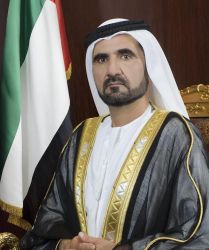Ismail III: Difference between revisions
No edit summary |
No edit summary |
||
| Line 51: | Line 51: | ||
}} | }} | ||
'''Ismail III''' (Gheiravic: إسماعيل بن عبد الرحمن, {{small|Transliteration:}} ''Ismā’īl ibn ʿAbd ar-Raḥman al-‘Aydarūs'', 1 April 1957 - 31 December 1996) was the last recognized [[List of Fahrani Monarchs|King of Fahran]], ruling from 29 November 1988 until his forced abdication on 11 December 1996 in the wake of the [[December Intifada]]. His reign saw a continued decline in the prestige of [[Fahran]], which had effectively ceased to be a regional power in the aftermath of the [[ | '''Ismail III''' (Gheiravic: إسماعيل بن عبد الرحمن, {{small|Transliteration:}} ''Ismā’īl ibn ʿAbd ar-Raḥman al-‘Aydarūs'', 1 April 1957 - 31 December 1996) was the last recognized [[List of Fahrani Monarchs|King of Fahran]], ruling from 29 November 1988 until his forced abdication on 11 December 1996 in the wake of the [[December Intifada]]. His reign saw a continued decline in the prestige of [[Fahran]], which had effectively ceased to be a regional power in the aftermath of the [[??? War]], and presided over a pair of severe economic recessions in 1991 and 1995 that left the government teetering on the brink of collapse. Despite the advice of his liberal-minded Prime Minister [[Mohammed Moghadam]], appointed at the close of 1991, Ismail was slow to implement the democratic reforms that had been promised when [[Sabir Afzal Rahmani]] stepped down as dictator in 1988 and, after a quarrel, Moghadam was dismissed and replaced with the more conservative [[Daoud al-Ghazawi]]. Such impulsive policy-making would remain a pervasive problem throughout his reign, and, at one point, prompted retired general [[Bassem Hadil]] to remark that his half-brother [[Abu al-Qasim ibn Abd ar-Rahman|Prince Abu al-Qasim]] would have been a more prudent choice of monarch. Ismail was notably suspicious of {{wp|neoliberalism|neoliberal}} trade policies, maintaining high tariffs and stringent price controls, especially over petroleum-related industries, even as inflation made basic commodities non-affordable for many of his subjects. His refusal to abolish shipping fees on freighters passing through the [[Strait of Asmara]] put immense strain on his diplomatic relations with [[Tarsas]] and [[Tulura]], and only served to further alienate wealthy industrialists and magnates within Fahran, who found the favoritism shown to the aristocratic class stifling and injudicious. | ||
==Early Life== | ==Early Life== | ||
Revision as of 17:37, 15 October 2019
| Ismail III | |||||
|---|---|---|---|---|---|
| King of al-Fahraan Mukarrib of the Hasidhmawt Sultan of Amran and Khimyariyyah Emir of Zabral | |||||
 Ismail attending peace negotiations after the May War | |||||
| Reign | 29 November 1988 - 11 December 1996 | ||||
| Coronation | 2 January 1989 | ||||
| Predecessor | Office Reestablished | ||||
| Successor | Monarchy Abolished List
| ||||
| Prime Ministers | |||||
| Born | 1 April 1957 Tel Imradhil, Fahran | ||||
| Died | 31 December 1996 Nirvan, Fahran | ||||
| Spouse | Oihana Victoria | ||||
| Issue | Hazea I | ||||
| |||||
| House | Aidarus | ||||
| Father | Abd ar-Rahman ibn Hatem | ||||
| Mother | Havîn bint Ardalan | ||||
| Religion | Malufi Irsad | ||||
Ismail III (Gheiravic: إسماعيل بن عبد الرحمن, Transliteration: Ismā’īl ibn ʿAbd ar-Raḥman al-‘Aydarūs, 1 April 1957 - 31 December 1996) was the last recognized King of Fahran, ruling from 29 November 1988 until his forced abdication on 11 December 1996 in the wake of the December Intifada. His reign saw a continued decline in the prestige of Fahran, which had effectively ceased to be a regional power in the aftermath of the ??? War, and presided over a pair of severe economic recessions in 1991 and 1995 that left the government teetering on the brink of collapse. Despite the advice of his liberal-minded Prime Minister Mohammed Moghadam, appointed at the close of 1991, Ismail was slow to implement the democratic reforms that had been promised when Sabir Afzal Rahmani stepped down as dictator in 1988 and, after a quarrel, Moghadam was dismissed and replaced with the more conservative Daoud al-Ghazawi. Such impulsive policy-making would remain a pervasive problem throughout his reign, and, at one point, prompted retired general Bassem Hadil to remark that his half-brother Prince Abu al-Qasim would have been a more prudent choice of monarch. Ismail was notably suspicious of neoliberal trade policies, maintaining high tariffs and stringent price controls, especially over petroleum-related industries, even as inflation made basic commodities non-affordable for many of his subjects. His refusal to abolish shipping fees on freighters passing through the Strait of Asmara put immense strain on his diplomatic relations with Tarsas and Tulura, and only served to further alienate wealthy industrialists and magnates within Fahran, who found the favoritism shown to the aristocratic class stifling and injudicious.